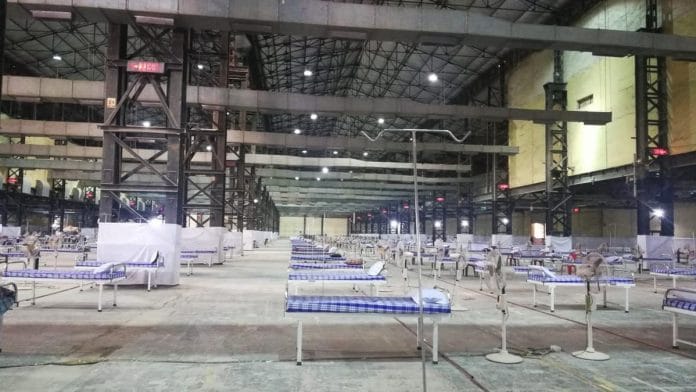Mumbai: For several weeks, a batch of 45 medical students from Wardha’s Mahatma Gandhi Institute of Medical Sciences (MGIMS) had been winding down their last leg of preparations for the examination for their Doctor of Medicine (MD) degree. But days before it was to begin, the exam was indefinitely postponed and they were asked to get ready for a different test altogether — fight the Covid pandemic.
On 10 May, the students were told to get ready to leave for Mumbai, the worst-hit city in India accounting for 22,746 Covid-19 infections and 800 fatalities so far, the highest in Maharashtra.
The students boarded a bus on 11 May and travelled 24 hours, nearly 800 km, to reach Mumbai on the 12th. Work began the next day.
“We had no idea where we would be working and the exact nature of the work. We didn’t even know how long or where we would be staying,” said Dr Babita Bondge, 27, a third year MD student who is specialising in medicine.
It was only during their journey that the students were told they would be working in the Seven Hills Hospital in Andheri. The 800-bed hospital is the largest one treating Covid-19 patients in Mumbai.
ThePrint met four students who shared their experiences while serving in the hospital for the last whole week.
While all of them said they were initially nervous, mainly because they were asked to travel from Wardha, which is a green zone, to Covid-19 hotspot Mumbai, this trepidation soon led way to a sense of duty.
The MGIMS was started in 1969 at Mahatma Gandhi’s ashram at Sevagram to provide healthcare services in rural areas. With Kasturba Hospital, its hospital wing, the 972-bed hospital provides subsidised treatment in the region.
This batch of MD students from MGIMS were among the first group that Maharashtra has recruited to fight the coronavirus pandemic. Dr T. P. Lahane, Director of Medical Education and Research in Maharashtra, had invoked sections of the Epidemic Diseases Act, the Disaster Management Act, and the Maharashtra Essential Service Maintenance Act to send a notification to MGIMS in this regard.
Only students with underlying health conditions or those pregnant were allowed to opt out.
The young doctors have been put up in Mumbai’s Lalit Residency, a five-star hotel, with all their meals and stay taken care of. There are, however, strict protocols in place for reducing exposure to other hotel staff — meals are eaten in the room and students are not allowed to loiter in the lobby.
Also read: In Mumbai’s civic hospitals, relatives are risking coronavirus to take care of loved ones
‘We are doctors, this is our job’
The idea of bringing in doctors to Mumbai from other states was to give a breather to the city’s exhausted workforce. Physicians in Mumbai have been pulling off longer hours for over two months in the demanding Covid-19 wards.
“Initially, our parents were concerned but now they just call to ask us if we are fine. They know we are doctors so this is our job,” said Dr Neerja Pethe, who is specialising in ENT.
Pethe, whose parents are from Mumbai has no plans of going home to avoid infection risks. “We are not sure how long we are here for…maybe two weeks or a month.”
Since they arrived, doctors at the Seven Hills Hospital could do the recommended six- hour duty in Covid-19 wards instead of the eight hours and 12 hours of night duty in the ICU earlier.
“The colleagues working in Seven Hills were very happy to see us,” said Bondge. She has been working in the hospital’s high dependency unit which has now been expanded by 40 more beds.
While the Seven Hills Hospital is running at its full capacity, more beds are getting free as new discharge guidelines does not make two negative results mandatory before letting go of a patient, said Dr Saurabh Uplechwar, who specialises in surgery and has been placed in the casualty ward.
Also read: ICMR’s random sample-based Covid survey a step in right direction: Harvard expert
‘Working on frontline is challenging, fulfilling’
All the students were used to working in a Covid-19 wing in Wardha where suspects were kept, but they had not yet treated any infected patient.
“The patient load in Mumbai is huge,” said Dr Uplechwar.
While they were used to wearing personal protective equipment (PPE), the students said it took them a day or two to get used to working in wards without AC or fans in Mumbai’s humid weather.
“We get fully drenched and cannot remove the PPE till our shift gets over. But we have become used to it and it doesn’t bother us now,” Uplechwar added.
For Dr Nikita Kathare, who specialises in anesthesiology, this experience of working on the frontline has been both challenging and fulfilling.
“There is actually little difference between the cases we handle in ICU at other times and the Covid-19 ones, other than the fact that healthcare workers are at risk,” she said.
The doctors also stressed that despite the widespread perception of the virus, most patients make a recovery and the number of serious cases is not very high.
There were some students who worried about their MD exams getting postponed. But for many others, like Kathare, the exams can wait. “We are not even thinking about it, it is a time of need, we are happy we were given this opportunity to work on the frontline.”
There are plans to bring more medical students from Latur and Ambajogai districts as Mumbai ramps up 1 lakh more beds to fight the rising coronavirus cases in the city.
Also read: 6 toilets for 20 houses, inadequate testing: Why Mumbai’s Worli chawls are a Covid hotspot






